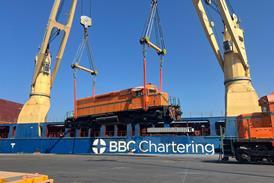AAL Shipping has confirmed that it will boost its fleet with several newbuildings and additional second-hand tonnage.
Kyriacos Panayides, managing director at AAL Shipping, said that the carrier will enhance its fleet with at least four newbuild, mega-size multipurpose vessels.
The 32,200 dwt units, which have been designed and developed in cooperation with Columbia Shipmanagement, are destined to hit the water in 2024.
Panayides said AAL Shipping completed its most-recent newbuilding programme seven years ago, and he welcomed the turn in fortunes seen for multipurpose operators over the past year. Nevertheless, the new additions, he said, “are still in line with what we had planned a long time ago. We are not being opportunistic”. Meetings regarding the newbuilds began in November 2020, and a design was in place as early as August 2020.
The vessels fit the mould of AAL Shipping’s fleet profile, which comprises predominantly larger multipurpose ships with heavy lifting capabilities. Panayides explained that the ships will be built at China’s Guangzhou Wenchong Shipyard and will feature three 350-tonne lifting capacity cranes that will enable heavy cargoes to be loaded and stowed across the ship’s entire deck length. Maximum lift capacity will be 700 tonnes.
Panayides noted that Columbia Shipmanagement has, as a group, been responsible for the development of some 270 newbuilds, and it drew on all of this experience to develop the third-generation of AAL Shipping newbuilds. Multipurpose ships, by nature, are more complex to design and build than container or bulkers, and widespread newbuilding activities in these sectors means that yard capacity at present is extremely tight. “These are ships to cater to the next generation of cargo demand,” he added.
The four newbuilds will run on low-sulphur fuel and have the capability to be converted to run on greener fuels, as and when they become viable for operators that run semi-liner and tramp services. Panayides described this decision as a “big dilemma” but conceded that the present bunkering infrastructure precluded a decision on an alternative fuel at present. The ships will be fully compliant with upcoming IMO CO2 regulations.
Panayides added that the accommodation blocks will be located at the front of the vessel. The fore position maximises the amount of over-dimensional cargo that can be stowed on deck without obscuring the master’s visibility.
AAL Shipping has been making adjustments to its fleet over the course of the past year, having taken delivery of four second-hand vessels: two G-class multipurpose heavy lift vessels – AAL Gibraltar (formerly Pacific Action) and AAL Gladstone – during March; and two 33,000 dwt W-class multipurpose ships – AAL Paris and Grey Fox.
This roster will be bolstered with the addition of two further W-class ships. Panayides said a memorandum of agreement (MoA) was signed in October for AAL Mars and AAL Merkur to join its fleet permanently. These ships had been already operating in the carrier’s fleet on a commercial management basis.
AAL Shipping, like many other carriers, has been moving containers on its services at healthy freight rates. Panayides noted, however, that it has continued to prioritise its traditional and long-term customers moving heavy and breakbulk cargoes.
With multipurpose tonnage being chartered out to container carriers (sometimes on one or two-year charters), disrupted schedules, and limited newbuilding activity, the present situation with regard to multipurpose capacity is extremely tight. Panayides expects the prevailing market conditions to exist until the end of 2022.
In addition to the container spill over, AAL Shipping is seeing a large backlog of its traditional cargoes coming back into the market on short notice, pushing rates up further. The carrier said it will continue to focus on its core markets; from Asia, peak demand is seen on the Asia-Europe, Asia-USA and Asia-Australia trades and it aims to run a service in both directions at least once per month. Most of its fleet space is fully booked until December 2021, with orders stretching well into 2022.
Panayides was keen to stress the importance of owning its own tonnage due to the volatile nature of the market. “Without ships, operators have no business model… that is why we continue to invest in our own,” he said.
















